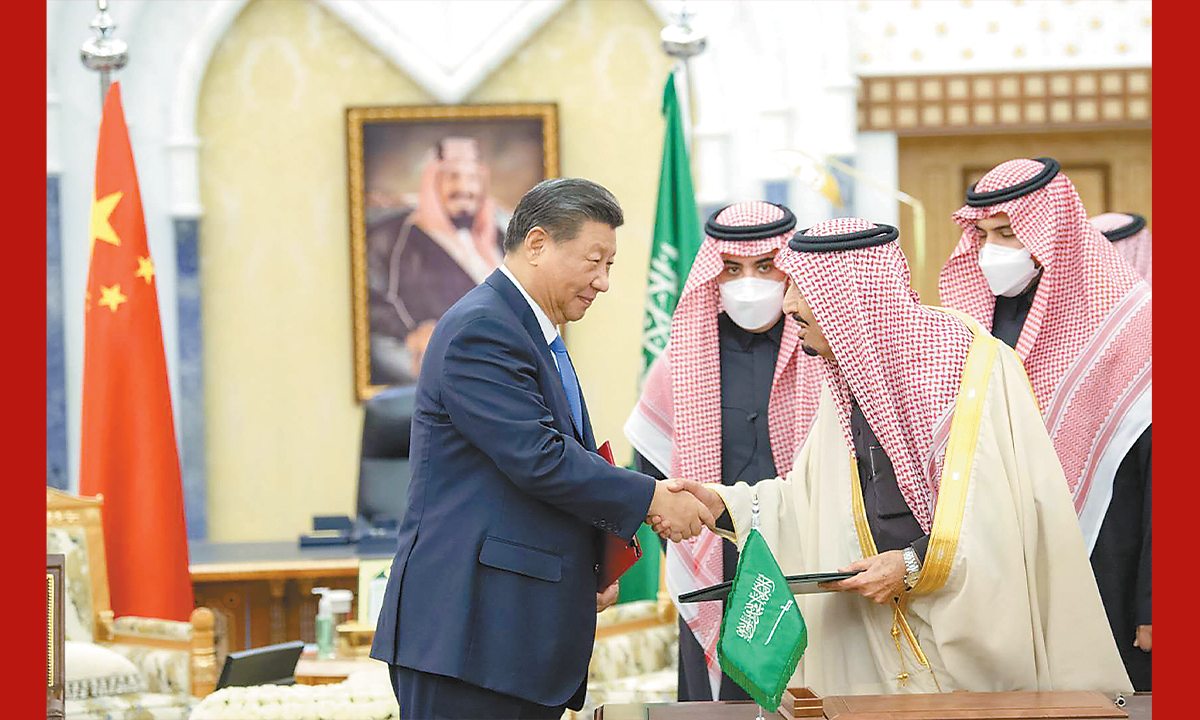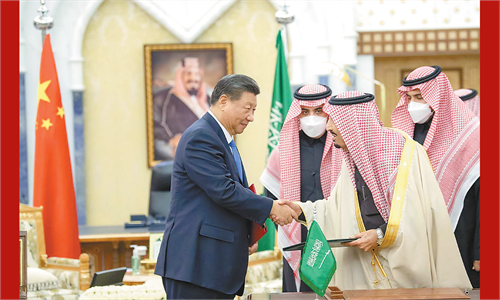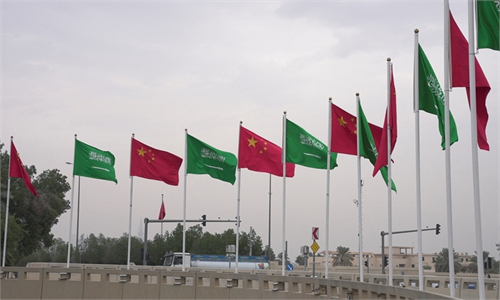
Chinese President Xi Jinping meets with King Salman bin Abdulaziz Al Saud of Saudi Arabia at Riyadh's al-Yamamah Palace in Saudi Arabia on December 8, 2022. Photo: Xinhua
When it comes to US decoupling strategy of China, the Arab world should forge its own independent policy and keep distance from the US anti-China measures to protect the rapidly deepening and crucially significant Arab-China relations. Currently, the world is on the cusp of a major transformation and the Arab countries are well-positioned to re-emerge great again. Many Arabs believe that the next phase of regional development will be completely different from that of the last hundred years. No one single country, or bloc of countries will have undue power to dictate how the rest of the world, including the Arab region, should develop. Therefore, various countries and regions are pursuing their own independent development strategies based mainly on their own national interests.
Arab-China ties are too strategic and too important to be influenced by any third party. Arabs are clear-eyed about their future; they have already determined their strategic direction. They fully understand that it is in their best interest to maintain neutrality in the current great power rivalry. They have decided that they will not pick sides and that they will fiercely defend their nonaligned position, regardless of the pressure they may face. Irrespective of what others think about their neutrality, Arabs will do everything in their power to remain strategically autonomous and avoid being entangled in great power competition. They will not allow anybody to use them as a pawn or a battleground for their own geopolitical gain.
After decades of humiliation, the Arabs are getting back their self-confidence; their vision for themselves and their region is becoming clearer. They increasingly see themselves as an independent pole in the de facto multipolar world that is emerging before our eyes. The Arab world's interests are not myopically limited to energy and security; they are much broader and far-reaching. With a clarity of vision, Arabs are building relations with countries from all parts of the world. The breadth and depth of Arab relations with other nations are determined by the ability and willingness of foreign nations to contribute to Arabs' development strategies and vision. Arab countries are interested in diversifying their economies, improving their technology and innovation production, building infrastructure, and offering job opportunities to their rapidly growing young population. Furthermore, they want to be considered and respected as an independent pole in their own right.
This is where China comes into the strategic thinking of Arabs. Today, China is a major global power; it is the world's largest trading country, the largest economy in PPP terms, the largest manufacturing hub, the largest filer of IP patents, the largest producer of scientific papers, the largest investor in renewables, the largest producer of solar panels, the largest producer of wind turbines, the largest energy consumer, and the largest oil importer. While others are not happy to see the Arabs rise as a pole in the emerging new world order, the Chinese welcome and support Arabs' ambition to become a pole and, in the process, contribute to democratizing the world system.
On the other hand, the Arabs are major energy producers and among the top holders of proven hydrocarbon reserves. They are in the center of global trade routes and have a huge untapped consumer market. They are major technology consumers and have so much economic growth potential. Hence, it is no wonder there are so many synergies and complementarities between the Arabs and Chinese. This also explains why China is the largest trading partner of Arab countries and why the Arabs are likewise China's largest oil suppliers. Additionally, there is a growing convergence of views between the two sides on human rights, core regional and global political issues, multipolarity and global governance architecture.
One underappreciated and insufficiently discussed aspect of Arab-China relations is China's generous offers of technology cooperation and transfer, and Arabs' eagerness for joint technology development collaboration. The Arabs are not happy about the technology partnerships they have with some of their traditional partners, because they try to restrict technology transfer and exert control over Arabs through their technology. China, on the other hand, offers technology partnerships with little restriction and almost no strings attached.
The Arab countries' relations with the world are organically diversifying, driven by their broadening and growing interests. China's growing capabilities are making China an attractive strategic partner for Arabs, while Arabs' reliable and secure supply of energy is essential for China's continued economic growth. There is so much untapped potential and synergy in Arab-China relations. The next couple of decades will witness exponentially strengthening relations between the two sides.
The author is former adviser to the chairman of the Abu Dhabi Executive Office, an authority responsible for Abu Dhabi's long-term strategies, and Asia Global fellow at the Asia Global Institute at the University of Hong Kong. This is the second article in the series - "Decoupling from US hegemony." opinion@globaltimes.com.cn


